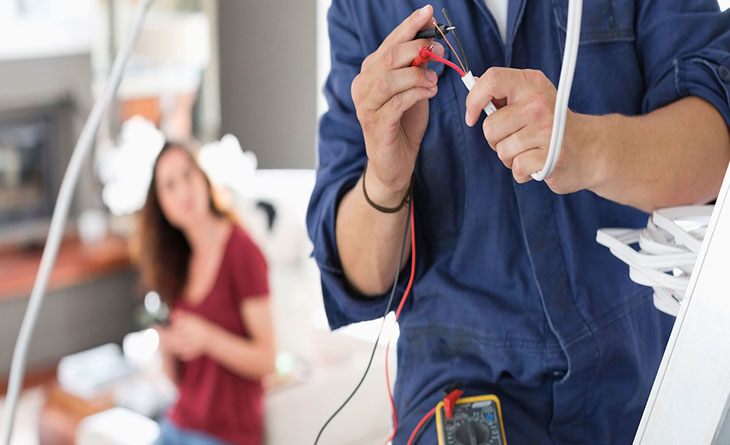Understanding the root causes and knowing how to address these electrical concerns promptly is crucial for maintaining a safe and functional living environment. Stay informed to safeguard your home and loved ones from potential electrical hazards.
Key Takeaways
-
Regularly check your Residual Current Circuit Breaker (RCCB): Test your RCCB periodically to ensure it is functioning correctly and providing protection against electrical shocks.
-
Stay vigilant for wiring problems: Keep an eye out for signs of faulty wiring such as flickering lights, burning smells, or charred outlets, and address them promptly to prevent potential hazards.
-
Prioritize safety by addressing overheating wires: If you notice wires getting excessively hot, immediately shut off the power source and contact a qualified electrician to investigate and resolve the issue.
-
Don't ignore low voltage concerns: Low voltage can damage appliances and indicate underlying electrical issues. Consult a professional electrician to diagnose and rectify the problem.
-
Know when to seek professional help: If you encounter persistent power outages, complex wiring problems, or any electrical issue beyond your expertise, do not hesitate to contact a licensed electrician for assistance.
-
Proactive maintenance is key: By understanding common electrical problems, testing your RCCB, and promptly addressing issues, you can ensure a safe and reliable home electrical supply.
Understanding Common Electrical Issues at Home
Signs of Electrical Problems
Flickering lights and frequently tripped breakers are common indicators of electrical issues at home. These signs should not be ignored as they may signify underlying problems within the electrical system.
Identifying these signs early on can help prevent more severe electrical faults and ensure the safety of your home and family. When you notice such issues, it is crucial to address them promptly by seeking professional help to diagnose and resolve the problems.
Risks of Unresolved Electrical Issues
Ignoring electrical problems can lead to serious consequences, including fire hazards. Faulty wiring or overloaded circuits are potential causes that can trigger electrical fires if left unattended.
By neglecting to address electrical dangers, homeowners put themselves at risk of property damage, injuries, or even fatalities. Prioritizing electrical safety is essential to mitigate these risks and maintain a secure living environment.
Common Causes of Electrical Failures
Outdated wiring and overloaded circuits are among the primary reasons for electrical system failure in homes. Over time, wiring deteriorates, leading to current leakages and increased chances of electrical accidents.
To prevent electrical faults, regular inspections of the electrical system are necessary. Upgrading outdated components, avoiding circuit overloads, and installing electrical safety devices such as circuit breakers can significantly reduce the likelihood of experiencing electrical failures.
Identifying Power Outages
Locating Issue
To determine the source of a power outage, first check if it's affecting just your home or the entire neighborhood. This helps in narrowing down the problem area.
Checking Circuit Breakers
Inspect the circuit breakers and fuses in your home to identify if the issue is internally related. Look for any tripped breakers or blown fuses as indicators of the problem.
Reporting to Utility Provider
If you experience persistent power outages despite checking your home's electrical system, it's crucial to report this to your utility provider. They can conduct further investigations to resolve the issue promptly.
What is a Residual Current Circuit Breaker
Function
A residual current circuit breaker (RCCB) is designed to prevent electric shocks by detecting leakage currents. It works by constantly monitoring the electrical current flowing through a circuit. If it detects any imbalance between the live and neutral wires, indicating a leakage, it immediately cuts off the power supply to prevent potential harm.
Difference
Compared to traditional circuit breakers, RCCBs offer an additional layer of protection due to their ability to detect even tiny leakage currents. While standard circuit breakers primarily focus on overloads and short circuits, RCCBs are specifically designed to safeguard against electric shock hazards caused by leakage currents.
Importance in Homes
Having an RCCB installed in your home is crucial for enhancing overall electrical safety. In the event of a fault or leakage, the RCCB acts swiftly to disconnect the power supply, reducing the risk of electric shocks and potential fires. Modern homes with various electronic devices and appliances can benefit greatly from the added protection provided by an RCCB.
Importance of Installing an RCCB
Legal Requirement
Installing an RCCB is a legal requirement in homes lacking existing circuit protection. This mandate ensures the safety of occupants by preventing electrical accidents.
RCCBs, also known as residual current circuit breakers, play a crucial role in reducing the risk of electric shocks and fires. By swiftly detecting any imbalance in electrical currents, RCCBs can cut off the power supply, averting potential hazards.
Benefits
The installation of an RCCB brings a multitude of benefits, such as enhanced safety standards and reduced chances of electrical mishaps. These devices provide an added layer of protection against faults in the electrical system.
-
Improved Safety: RCCBs offer advanced protection by monitoring the flow of electricity and promptly disconnecting the circuit in case of abnormalities.
-
Risk Reduction: With their ability to detect leakage currents, RCCBs significantly minimize the risk of electrical accidents, safeguarding both life and property.
Assistance Program
For homeowners seeking support with RCCB installation, various assistance programs are available. These programs aim to educate individuals on the importance of proper electrical safety measures and facilitate the installation process.
-
Guidance Services: Homeowners can benefit from guidance services provided by professionals to ensure correct installation and operation of RCCBs.
-
Financial Aid: Some programs offer financial aid or subsidies to make it easier for homeowners to comply with the legal requirements for installing RCCBs.
How to Test Your RCCB
Testing Procedure
To ensure your Residual Current Circuit Breaker (RCCB) is functioning correctly, follow a three-step testing procedure. First, press the test button to simulate a fault condition. Second, the RCCB should trip immediately, cutting off power. Lastly, reset the RCCB to restore power.
Frequency of Testing
Homeowners should test their RCCBs every three months to guarantee optimal safety measures. Regular testing ensures that the RCCB can effectively detect and respond to electrical faults promptly.
Contacting a Licensed Electrical Worker
If the RCCB fails to operate as expected during testing, homeowners should contact a Licensed Electrical Worker for further inspection and repairs. It is crucial to address any malfunctions promptly to maintain electrical safety in the home.
Recognizing Wiring Problems
Unusual Indicators
Unusual smells or buzzing sounds in your home could indicate wiring problems. These signs should prompt immediate inspection to prevent potential hazards.
Impact on Safety
Damaged or frayed wires can pose significant safety risks. They may lead to electrical fires, shocks, or even short circuits, affecting the overall electrical performance of your home.
Regular Inspections Encourage routine inspections of your wiring systems, especially in older homes. These checks can help identify issues early, preventing costly repairs and ensuring the safety of your household.
Handling Low Voltage Concerns
Check Connections
Low voltage can affect appliance performance and lead to operational issues. It is crucial to check connections and circuits to identify the source of low voltage problems. Loose or faulty connections can result in voltage drops, impacting the efficiency of electrical devices.
It is essential to ensure that all connections are secure and free from damage. Faulty connections can cause fluctuations in voltage supply, leading to issues such as dimming lights, slow appliance performance, or even complete power failure. Regularly inspecting and maintaining connections can prevent potential hazards.
Consult Electrician
Persistent low voltage issues may indicate deeper problems within the electrical system. In such cases, it is recommended to consult an electrician for a thorough inspection and diagnosis. An electrician can conduct detailed assessments to pinpoint the root cause of low voltage concerns.
An electrician's expertise is crucial in identifying and resolving complex electrical issues related to low voltage. They have the knowledge and tools to diagnose circuit problems, current leakages, or earth leakage issues accurately. Seeking professional help ensures the safety and proper functioning of the electrical system.
Addressing Overheating Wires
Signs of Overheating
Discoloration and melting insulation are common signs of overheating wires. When inspecting your electrical system, look for any burnt or discolored areas on the wires.
Potential Dangers
Overheating wires pose a significant risk of electrical fires. If left unaddressed, the excessive heat generated by these wires can ignite nearby materials, leading to a potentially catastrophic fire.
Immediate Action
If you suspect overheating wires in your home, it is crucial to take immediate action. Disconnect power to the affected circuit to prevent further overheating. Contact a professional electrician promptly to assess the situation and address the underlying cause.
When to Contact an Electrician
Critical Situations
Frequent Circuit Breaker Trips: If your circuit breaker frequently trips, it could indicate overloaded circuits or faulty wiring. Contact an electrician promptly to prevent potential hazards such as electrical fires.
Persistent Power Outages: Persistent power outages in your home might be a sign of underlying electrical issues. Emergency electricians can diagnose the problem and ensure a safe resolution.
Safety Concerns
Licensed electricians have the expertise to address complex electrical problems safely. Electrical shocks and fires pose serious risks, highlighting the importance of professional intervention.
Compliance and Regulations
Hiring a licensed electrician ensures compliance with safety regulations and building codes. Licensed professionals guarantee quality work that meets industry standards.
Expert Advice
When facing any electrical issue beyond basic troubleshooting, seek guidance from experienced electricians. They can provide valuable insights and solutions for electrical checks and repairs.
Final Thoughts
You now have a better grasp of common electrical problems at home, from power outages to wiring issues. Understanding these concerns empowers you to safeguard your household. By recognizing warning signs early and taking proactive steps like installing an RCCB, you can enhance your home's safety and prevent potential hazards. Remember, testing your RCCB regularly and addressing overheating wires promptly are crucial in maintaining a secure electrical system. While you can troubleshoot some problems independently, always prioritize safety and seek professional assistance when needed.
Take charge of your home's electrical well-being by staying informed and proactive. Your vigilance can protect your loved ones and property from electrical mishaps. Stay safe, stay informed, and keep your home electrically sound.

